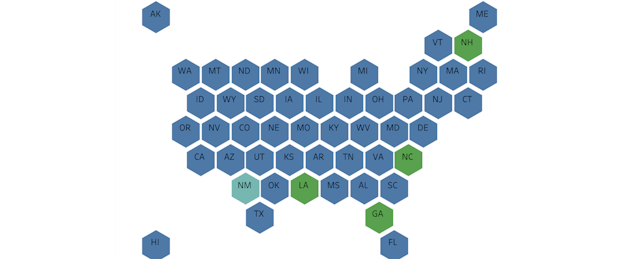What happens when the $1.3 billion state summative assessment market begins to merge with the growing $1.6 billion market for formative assessments? Investors and the education community are closely watching emerging models and how they could shape the markets for related instructional and intervention materials.
A critical indicator is the handful of states trying to create new assessment models. Under the authority of the Every Student Succeeds Act’s (ESSA) Innovative Assessment Demonstration Authority (IADA), Louisiana, Georgia, North Carolina, and New Hampshire are rethinking their summative assessment program by incorporating key features of formative assessments into pilots.
- The Georgia pilot allows districts to develop a formative assessment model that can roll up into a summative score. Districts can test different approaches to assessment that could include cumulative year-end assessments, competency-based assessments, instructionally embedded assessments, performance-based assessments, or any mix thereof.
- The North Carolina model will utilize formative assessment “check-ins” throughout the year that can aggregate into a summative measure of academic achievement and a student’s readiness to move on. A goal is to improve the usefulness and timeliness of test results so teachers may better personalize learning for students.
- Louisiana is combining English and social studies exams into unified assessments that students take throughout the year, rather than one longer test at the end of the year. The exams focus on the curriculum that students have been exposed to by using passages from books that are part of the curriculum, rather than passages that are new to them.
- New Hampshire’s Performance Assessment of Competency Education (PACE) program replaces annual standardized tests with project-based assessments that are embedded into regular classroom activities. PACE has been under construction since 1997, which tells us something about the complexity of the work.
New Mexico is a special case. The education agency is not running a pilot; rather it put out a request for proposal in June 2019 for vendors to come up with a new and ambitious program for statewide assessments.
According to the RFP, the state intends to move “away from a traditional format, state-controlled set of standardized summative assessments to an innovative, authentic, and balanced system focused much more on local control, cultural responsiveness and relevance, and actionable data at the district, school, classroom, and student level.” The RFP also requires respondents to go “beyond academic achievement to address the whole child by measuring non-academic components of 21st-century skills often labeled as socioemotional learning, soft skills, or well being to create a holistic picture of each child.” And that’s only two of many complex and ambitious sentences in the RFP.
This effort to redesign the assessment market is exciting. A reshuffled $3+ billion market sounds intriguing, but let’s not forget the past. History reminds us it’s often prudent to temper expectations and turn up the humility.
Back when PARCC and Smarter Balanced were in development in 2010, there were grand designs to reduce stale summative assessments and develop cutting-edge “through-course” assessments that were closer to classroom instruction and more meaningful to teachers. That turned out to be technically challenging, expensive and, over time, the consortium governing boards trimmed their ambitions to traditional and manageable summative assessments.
Nearly a decade later, the excitement for new and better-balanced assessment is percolating again. How these states progress over the next few years will be a critical signal of the kinds of new market opportunities that emerge.


